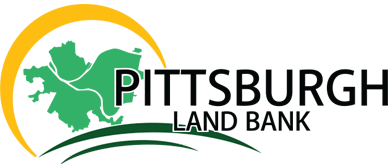Purpose
The Purpose of the Pittsburgh Land Bank is to return unproductive Real Property to beneficial reuse, through an equitable, transparent, and public process, revitalize neighborhoods to strengthen the City of Pittsburgh’s tax base and support socially and economically diverse communities.
Background
The Pittsburgh Land Bank was created via local ordinance in the Spring of 2014. It operates city-wide within the municipal boundaries of Pittsburgh. In November 2020, the Urban Redevelopment Authority (URA) integrated the Pittsburgh Land Bank (PLB) as an affiliate entity.
Introductory Video
A short introduction to Land Banking, Land Bank 412, from Urban Matters:
What is a land bank?
A land bank is a locally-created, locally-controlled, state-enabled, single-purpose entity whose job it is to acquire, manage & maintain, and market blighted, abandoned, and tax-foreclosed properties. These properties are sitting deteriorated and unused, bringing down surrounding property values and depressing the local market. Land banks offer a number of robust options to intervene in otherwise negative dynamics in the real estate market which often encourage, rather than minimize, urban blight. Properties that are too deteriorated, low-value, or constrained by environmental, legal, and/or financial liabilities to be feasibly rehabbed by the private market can often be turned into assets by the intervention of a land bank (Cost of Blight).
What does the land bank do?
Land banks enable would-be property owners to invest in their communities. The job of the land bank is to make it faster, easier, and cheaper for responsible new owners—developers, community groups, neighbors, farmers, gardeners, builders—to fix up blighted, abandoned properties and get them back into the market and onto the tax rolls. A land bank disrupts the endless cycle of vacancy, abandonment, and tax foreclosure by returning previously problem properties to productive and income-generating, neighborhood-improving uses.
Is the land bank a government agency?
The land bank is not a direct department or division of the City of Pittsburgh, but rather an independent corporation enabled by state law (Land Bank Legislation). The land bank acts as a distinct local government entity created by local legislation (Local Ordinance) with its own Board of Directors (Board of Directors) made up of representatives of local and state government, public agencies, and community members, with an eye towards the expertise needed to build and operate a Land Bank. The Board fairly and accurately represents the communities most directly affected by blight and abandonment.
Does the land bank infringe on property rights?
Land banks protect property rights. Our current system allows irresponsible property owners to strip equity from law-abiding, tax-paying owners. The presence of a single blighted property on an otherwise stable block reduces the market value of neighboring properties by thousands of dollars. This not only harms those owners, it reduces the taxable value of their properties, thereby taking revenue from local governments.
Doesn’t the City already have departments for this?
Why not use existing entities, like redevelopment authorities or local governments? Similar to Pittsburgh’s URA, a Land Bank is a single-purpose entity. A Redevelopment Authority’s focus is economic development. While access to land is a major element in helping the URA reach this goal, it is but one of the building blocks the URA uses to achieve its mission. For the Land Bank, the recycling of vacant, abandoned, under-productive land will be its sole purpose and focus. It will be a critical partner of the URA and the City Real Estate Division, and of neighborhoods and individuals wishing to reclaim blighted property. Many local governments do ‘bank’ properties, usually reluctantly via tax foreclosure surplus – an unintended consequence of enforcing delinquent tax obligations. Thus, the staff, expertise, nor financial resources, exist to effectively maintain, manage, and market these properties. As a result, local governments can become exactly what they are trying to fight – large-scale owners of vacant and blighted properties. Land banks, on the other hand, have the technical and financial capacity, and the mandate, to systematically inventory, maintain, and sell properties in a way that strengthens local markets, engages the community, and improves neighborhoods.
Why do we need a land bank?
Because currently, it is no one’s single job—or within anyone’s express power—to look at all the vacant blighted property in the city and get it into productive re-use. Obstacles such as an inability to find an owner and lack of clear, legal title—with no clear path to retrieve it, and debt on the property that often exceeds the property’s worth—overwhelm potential buyers. Local communities need a modern system for addressing blighted, abandoned properties to make it easier for responsible buyers to purchase and develop land that is currently unavailable in order to revitalize local housing markets, raise property values, and improve community infrastructure.
Land bank or land grab?
Non-displacement is the highest priority for the land bank, with homeownership preservation as a main goal. Currently, there are systems in place that require tax-foreclosing bodies to provide hardship payment plans to owner-occupants who are unable to pay their taxes. This requirement does not change with the creation of a land bank. The land bank will make every effort to work with owner-occupants to keep individuals and families in their homes, looking to develop programs which assist long-time owners in ensuring they own their homes free and clear, unencumbered of legal and financial obligations, wherever possible. It will refrain from purchasing owner-occupied housing so as not to displace individuals or families.
Can the land bank kick you out of your house if you owe taxes?
Homeownership preservation and the preservation of affordable housing are critically important here. Both the state legislation that authorizes the creation of land banks and the Pittsburgh Land Bank has an express goal of keeping people in their homes (Policies and Procedures). There is a longstanding system in place for delinquent tax payment plans for homeowners to access. Additionally, the City’s Federally mandated Foley settlement language provides a safety net for those who have fallen on hard times.
Still want to know more about Land Banking? Check out our Resources Page!
